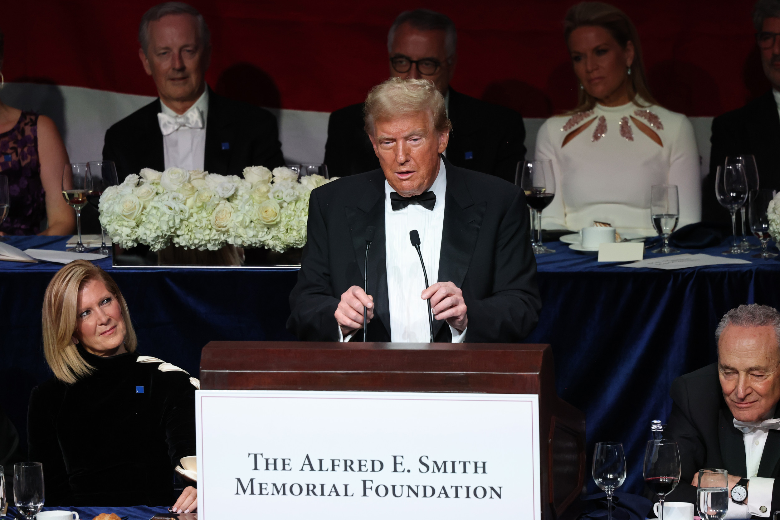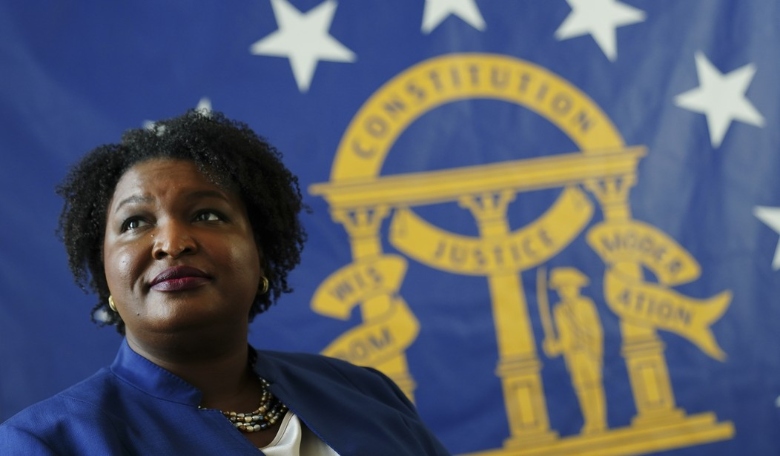In yet another strange twist in today’s political climate, The Washington Post has taken it upon itself to track down the writers behind former President Donald Trump’s jokes at the Al Smith Dinner. Yes, you read that right. One of the nation’s largest newspapers is now dedicating resources to uncover who penned Trump’s punchlines. The question on everyone’s mind: why?
Trump, who spoke at the charity event, delivered a series of well-received jokes, leaving the audience laughing and even surprising some critics with his humor. Many attendees said he “killed it” with his witty one-liners and spot-on delivery. But apparently, the success of his comedic performance raised alarm bells for some in the media, leading The Washington Post to zero in on the identity of his joke writers.
Jennifer Oliver O’Connell, a conservative writer, praised Trump’s comedic timing, noting that he had the crowd in stitches. But while most people were discussing how well Trump did at the event, The Washington Post seemed more concerned with the who behind the humor. Their apparent investigation into who wrote the jokes has left many scratching their heads.
Update: I've learned that the jokes were written by comedian Nick Di Paolo, who does not work/freelance for Fox but is a vendor and writes jokes sometimes for the show "Gutfeld." He sent 6 jokes to Trump and 1 was used.
— Jeremy Barr (@jeremymbarr) October 18, 2024
The state of media right now is that who wrote Trump's Al Smith Dinner jokes gets a harder investigation than Doug Emhoff slugging a woman in the face in public. https://t.co/KeNYVhzZmS
— Stephen L. Miller (@redsteeze) October 18, 2024
For context, the Al Smith Dinner is an annual event that raises funds for Catholic charities and has become a key political tradition. Both presidential candidates usually attend, making light of themselves and current political affairs in a comedic way. However, this year, Vice President Kamala Harris, the Democratic nominee, chose to skip the event—the first time in 40 years that a major candidate did not attend. Harris’ absence was so notable, she was described as the “elephant in the room” without even being there.
Instead of showing up in person, Harris sent in a pre-recorded video. But her attempt at humor fell flat, leaving the pro-Harris crowd groaning in pain—not only because of the lackluster jokes but also because of the poor delivery. In contrast, Trump’s jokes landed with precision, making Harris’ absence and her weak performance all the more noticeable.
Critics have pointed out that Harris’ campaign has been plagued by poor messaging, lack of appeal to voters, and her perceived inability to connect with key constituencies like Black and Hispanic men. And her team of “mean girls” (a jab at the image Harris’ campaign often gives off) decided to go after Trump instead of focusing on how to improve Harris’ faltering efforts. But in this case, their attempts to mock Trump fell short, especially considering how well he performed in front of the Al Smith Dinner audience.
One of the key takeaways from Trump’s performance was his use of humor as a political tool. Comedy, as they say, is hard. Either you deliver, or you don’t. And Trump certainly delivered, leaving people laughing and entertained. What The Washington Post apparently sees as scandalous is that Trump—like any high-profile figure—did not write his own jokes. Shocking, right? As if it’s breaking news that comedians and public figures often rely on writers to craft their material.
This isn’t new. Comedy legends like Bob Hope famously worked with a team of joke writers. Even the jokes Hope didn’t use would be saved in filing cabinets, in case they could be useful later. Trump, though naturally funny in many people’s opinions, isn’t expected to have the time or expertise to write his own jokes for an event like this. So, what makes The Washington Post think this is a story worth chasing?
Perhaps the issue is not really about Trump’s jokes but about Harris’ struggles. Harris, according to her critics, has become a “massive joke” herself. Her inability to deliver a strong performance on a big stage and her campaign’s floundering have left many Democrats frustrated. Meanwhile, Minnesota Governor Tim Walz, another Democrat mentioned at the event, can’t seem to tell the truth to save his soul. The media, for its part, appears increasingly desperate, especially as it watches Harris and the Democratic establishment’s candidate, the one “NO ONE VOTED FOR,” stumble on the national stage.
Instead of examining the real issues facing Harris’ campaign or exploring why voters aren’t connecting with her, The Washington Post is focusing on Trump’s joke writers. And the question remains: who cares? Does it really matter who wrote the jokes? The more pressing question is why the media feels the need to obsess over such trivial matters while Harris, Walz, and other Democrats struggle.
While we aren’t quite at the point of having a “What is going on?” moment like many Americans did during Joe Biden’s debate with Trump, we are getting close. And as the media grows increasingly panicked about the state of their preferred candidates, The Washington Post seems intent on distracting the public with stories about Trump’s joke writers.
Who knows, maybe The Washington Post will bring back its “muckraker” Taylor Lorenz to expose the “scandal” of Trump’s joke writers. Or maybe those writers will end up “doxed” for the crime of making people laugh at Trump’s jokes. Either way, it’s hard to make this stuff up, but it seems the media will keep trying.

